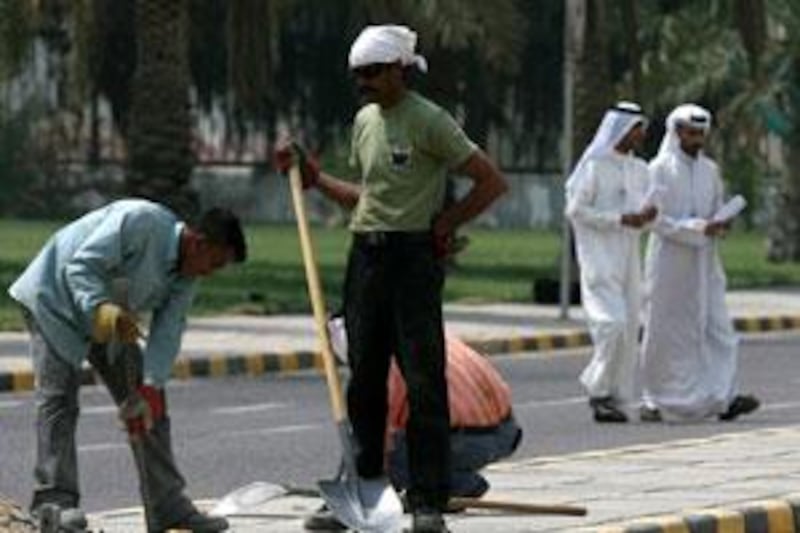KUWAIT CITY // Kuwait's parliament has approved a draft law to improve workers' rights, but unless the controversial sponsorship system is overhauled and domestic labour included in the new law, the emirate may not achieve its aim of getting off a human trafficking "blacklist", a prominent human rights campaigner said on Tuesday. "The biggest problem that is facing the human rights situation in Kuwait is the treatment of foreign labour," said Amer al Tameemi, the board secretary of the Kuwait Society for Human Rights, especially those who are not highly skilled, "and they represent about 75 per cent of the foreign labour in the country". Foreign labourers in Kuwait represent more than 60 per cent of the population and 80 per cent of the labour force. Othman al Saif, a Kuwaiti lawyer for foreign workers, said about half of his clients were sent by the Pakistan Embassy. A slew of dismissals in the wake of the global financial crisis is keeping his practice busier than usual. He is also involved in cases of domestic abuse and has just closed a case involving an Indian maid. "The employers became angry and threw scalding tea in her face - just because they were angry," Mr al Saif said, which left the maid with scarring around her eyes and nose. The lady who threw the tea received a 100 dinar (Dh1,250) fine, but Mr al Said said he would push for a heavier fine."Now we will make a civil case. I will try to get at least 5,000 dinars (Dh62,800). I think the judges must be tougher with criminals," he said. Although this is an extreme example of maltreatment in Kuwait, other types of abuse are more common. The US Department of State's 2008 people trafficking report said low-skilled labourers in Kuwait were "subjected to conditions of forced labour, such as restrictions on movement, unlawful withholding of passports, non-payment of wages, threats, and physical or sexual abuse". The report ranks Kuwait in the bottom third tier along with 14 other countries including Saudi Arabia, Qatar and Oman. Myanmar, North Korea and Iran are in the same group. The UAE and Bahrain have lifted their grade in recent years and are ranked in the second tier. The GCC hosts 13 million foreign labourers in total, 66 per cent of whom are from Asia and 28 per cent Arab. Its low placing is seen as a stain on Kuwait's international image and the new labour law is being seen as an attempt to mend that. The details of the law were discussed at a four-day conference that began last Sunday organised by the International Organisation for Migration, which brought together staff from government ministries, human rights organisations, trade unions and diplomats. "There is a realisation of the need to adjust the legal framework," Josephus Jimenez, the labour attaché at the Philippine Embassy, said at the event. "I have to commend the Kuwait government for initiating this because they did not have to do it. They've done it of their own initiative. "The new rights that they are giving to the workers, some of them are even higher than the standards of the ILO [International Labour Organisation]. Vacation leave, sick leave - it's very good." The draft law increases the annual leave of private-sector workers from 15 to 30 days, in addition to 13 public holidays. It includes increased sick leave, maternity leave and better indemnity payments. Employers will not be able to force women in many jobs to work nights and termination notice is increased from one month to three. But Mr al Tameemi said the law fails to address two crucial issues: the controversial sponsorship system and domestic labourers. Sponsorship requires "a company or a businessman or a family head" to give permission for someone to obtain legal residency. Without it, the employee cannot enter, work, change jobs or leave. All GCC states have a similar system. "Those who abuse the system create artificial companies. They say we need 50 workers in certain jobs. Once they apply and get approval, they bring those people in" with no intention of providing work. The migrants have to pay their sponsor to remain in the country and work illegally elsewhere. "Sometimes they charge them 500 dinar a year," he said."They just leave them on the streets ? It's a very corrupt system." Other people bring in domestic helpers to sell to other families. The abuses amount to human trafficking. Another criticism of the law is that it does not cover maids. Kuwait has 550,000 domestic helpers, mostly women, from Bangladesh, Sri Lanka, India, Indonesia and the Philippines. That is one servant for every two Kuwaitis. Most families have at least two servants and upper middle-class families will have as many as five. Rich families typically have about 10 domestic helpers, Mr al Tameemi said. "It's a society that is heavily dependent on foreign labourers. It makes them [Kuwaitis] idle. They hardly work in their homes. Even the children are raised by domestic servants." As they are not protected by the labour law, embassies will negotiate for the domestic helpers in disputes. The Philippine Embassy's labour section provides shelter for runaway maids. More than 100 women currently stay there. The government maintains another shelter and plans to open a larger one with 400 beds. Shahidul Haque, the regional representative for the International Organisation for Migration, is positive about the future of labour rights in Kuwait. He said the government was "looking at alternatives" to sponsorship. "They think they will be the first in the GCC to have a law for the domestic workers," he said. Whether statements of intent on the most pressing issues will get Kuwait off the human rights blacklist remains to be seen. jcalderwood@thenational.ae
Kuwait urged to expand labour reform
The emirate has been praised for its moves to improve job conditions but campaigners say unskilled foreign workers also need protection.

More from the national




